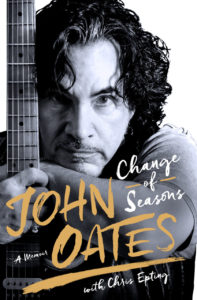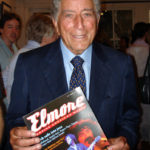One-half of the mega-hit duo Hall & Oates, John Oates states at the outset that he hasn’t written the Hall and Oates story, but the John Oates story, a thoughtful account of his personal journey from Philly schoolboy to top-of the world-star, on down to a bankrupt guy whose time may have passed, and finally to his emergence as a balanced, thoughtful and highly successful human being.
Oates chronicles his life beginning with his large Italian family, his rural Pennsylvania upbringing and musical training beginning at age four or five (in his first audition, in Atlantic City, NJ, he sang “Volare” in Italian), his early love of sports and auto racing, and his musical evolution. John Oates wasn’t a late bloomer in any way: everything the man became showed up early in his life.
Interestingly, Oates explains his decision to became a journalism major “because I was good at typing and there was very little homework,” but his is not the story of a slacker. Yes, the hippie mentality played heavily in his journey to seven platinum albums and 40 million records sold, but Oates worked his laid-back ass off and—sometimes unconsciously—went with the flow. His success story brings to mind the old shipwreck adage “Pray to God, but row toward shore.”
Oates began a lifelong friendship with Daryl Hall (then Daryl Hohl), when their two respective groups were booked to lip-synch their singles at a Philadelphia radio-station record hop early in their college careers, and Oates’ stories include the rich, the famous, and the infamous. From Quincy Jones to George Harrison, Tommy Mattola to Hunter S. Thompson, from performance auto racing greats to tennis greats, Oates has “played” with them all, at a professional level.
The books flaws are minor. Depending on the page, Oates has sold 40, 60 or 80 million albums. His sudden reference to “my wife” sent me scrambling backward, unsuccessfully searching for a reference to a serious relationship, and an entire chapter on shaving off his moustache was followed by a photo of Oates with a huge moustache. (David Crosby also famously wrote a song “Almost Cut My Hair;” it must be a guy thing.) That said, I’ve no doubt that this book is honestly written.
Oates’ story serves as a primer for anyone interested in becoming a star. Though they are not unique in the industry, with Daryl Hall, John Oates did it all: put in the time, made some lucky connections, found, lost and re-found love and the Daryl Hall connection, wrote enduring and commercial songs, nearly died, had adventures with famous characters, earned huge triumphs and huge disappointments, got shafted monetarily, kept working until it got fixed, and—this may put him in the minority—stayed human throughout.
Never preachy or self-important, Oates has told his story in refreshingly straightforward and accessible terms, neither gloating about his accomplishments nor apologizing for the missteps. Maybe he learned something in those journalism classes, after all, because Change of Seasons is a very good read.
—Suzanne Cadgène








Be the first to comment!